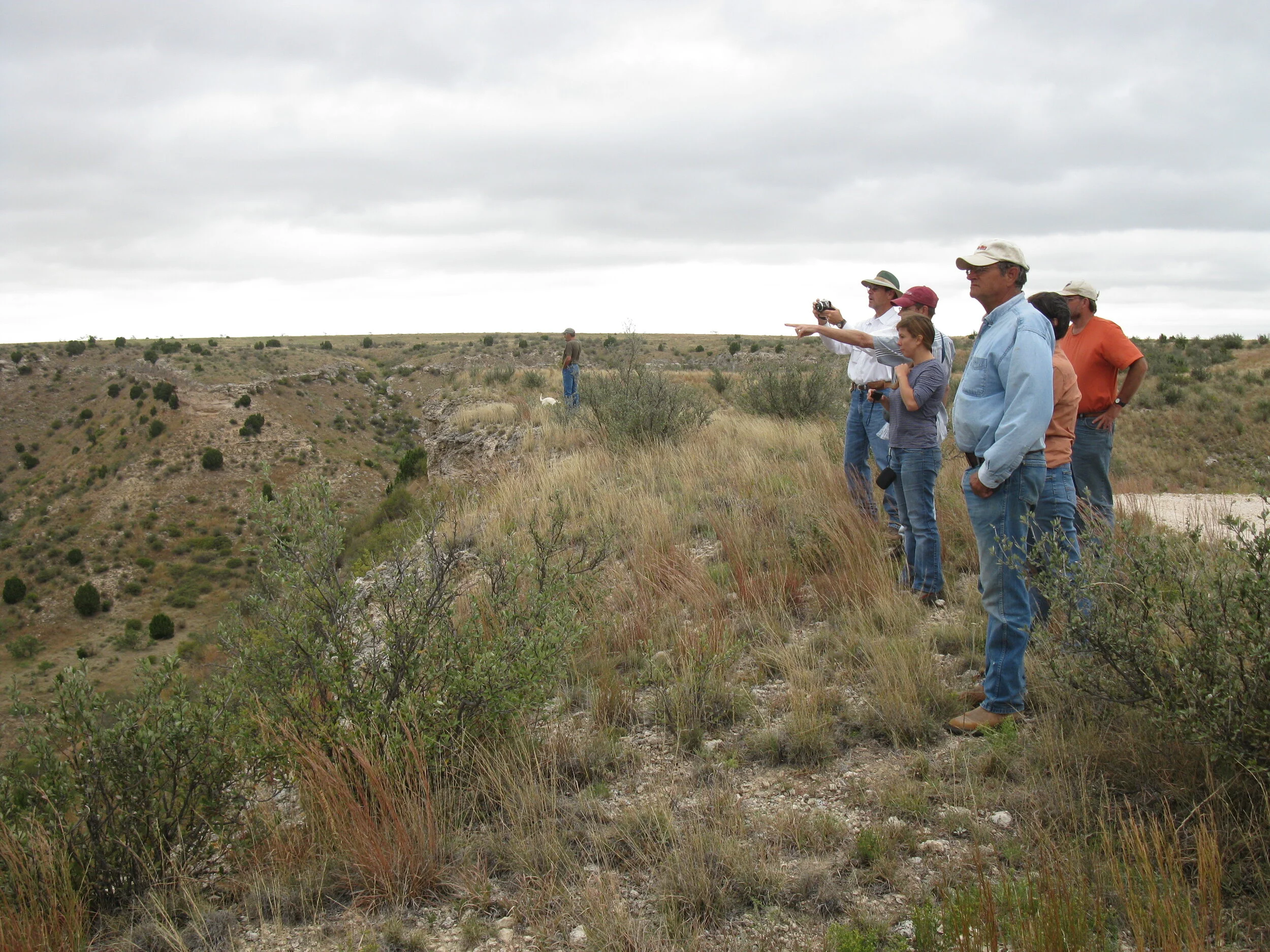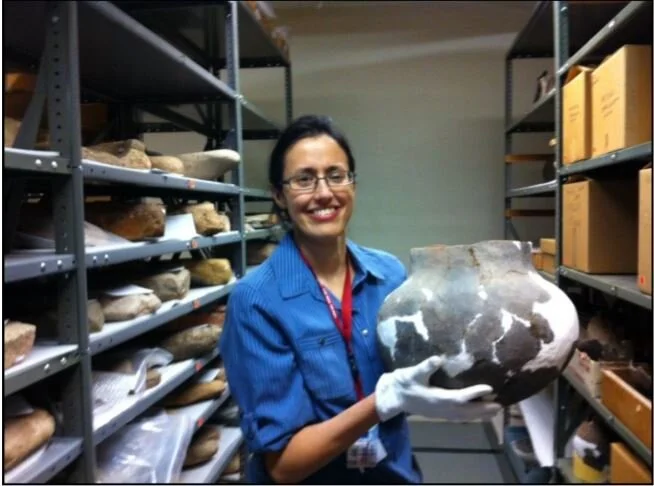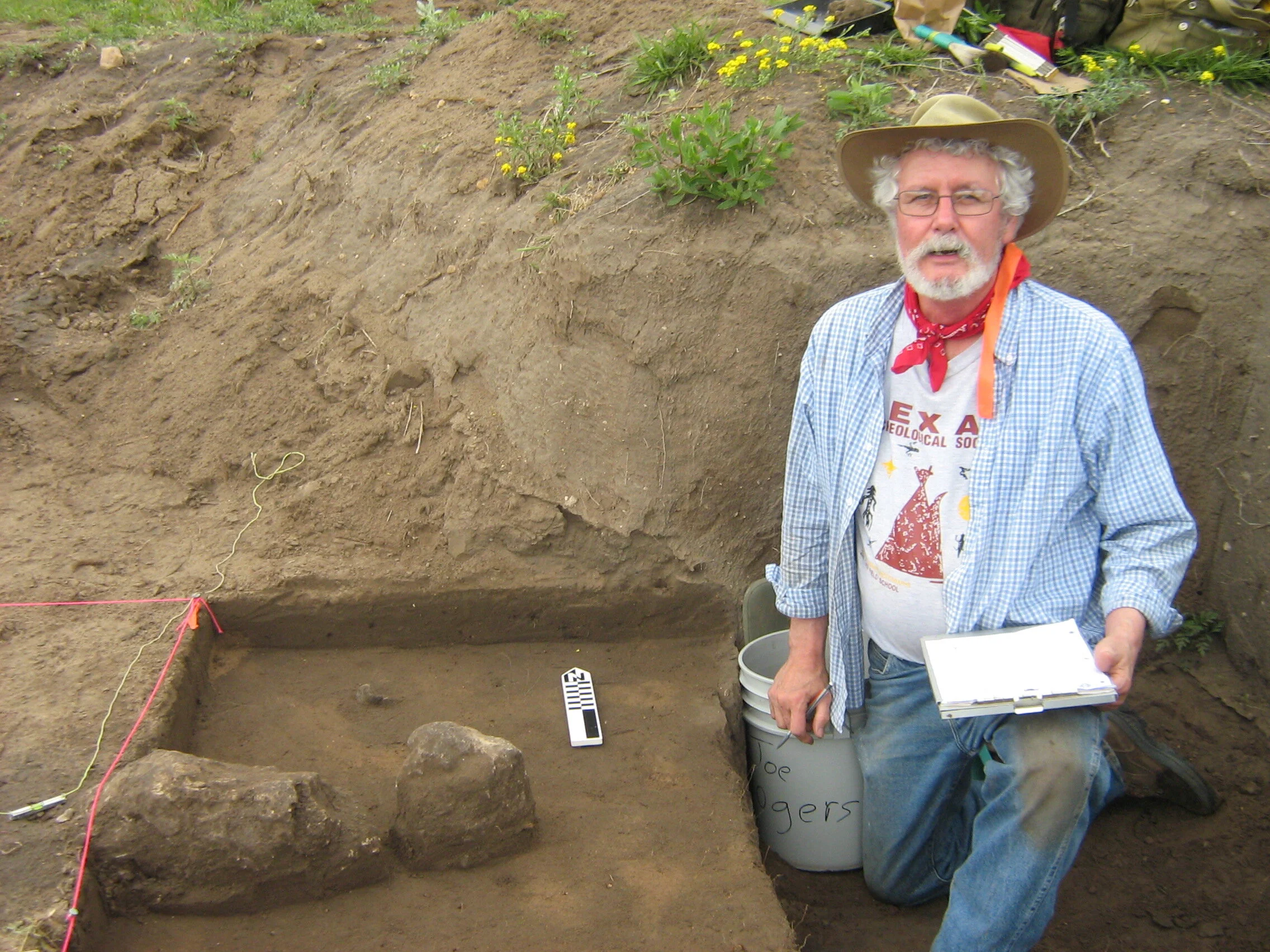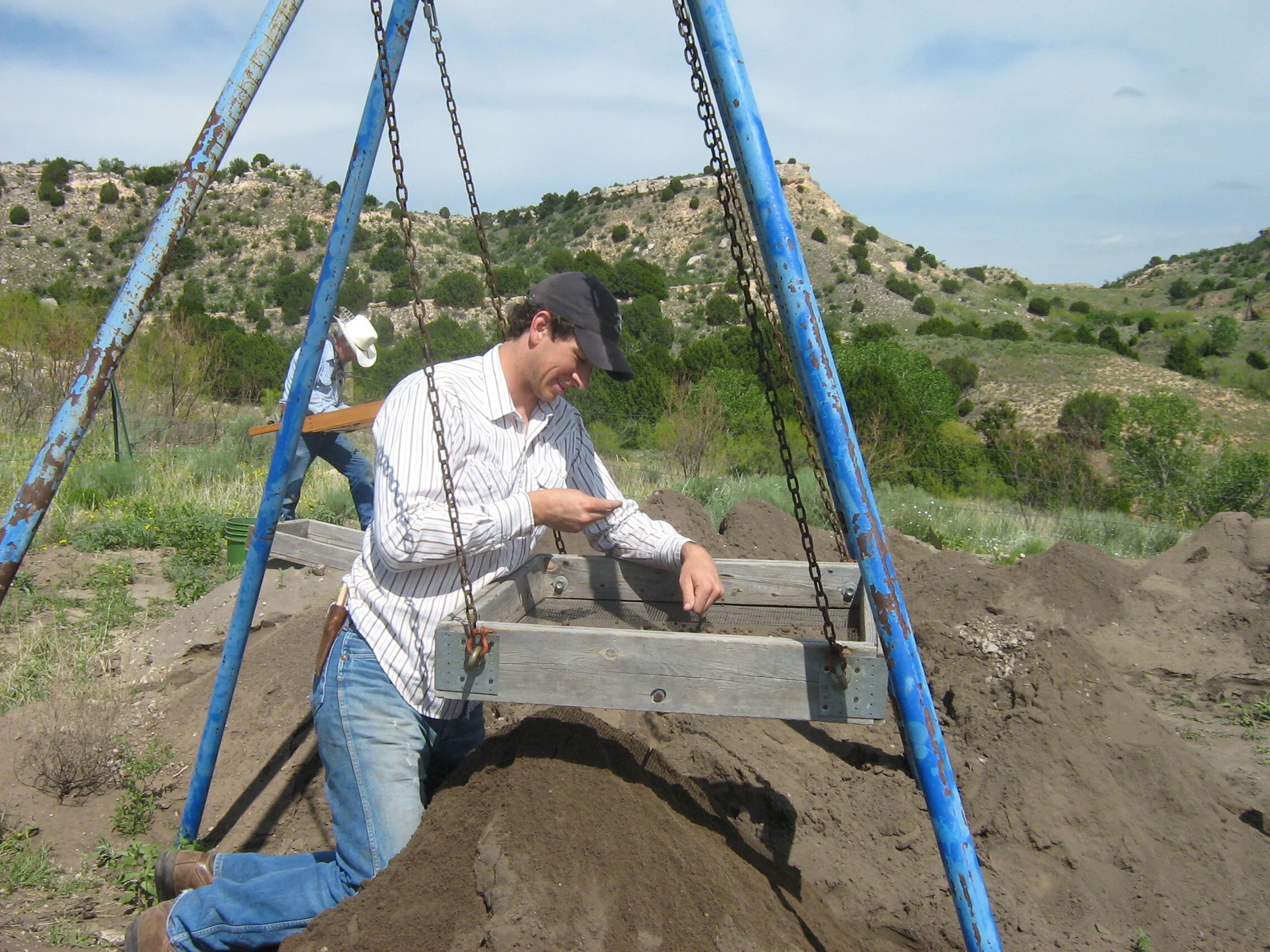
PAR is a non-profit organization dedicated to uncovering the unknown history of the Southern Plains.
Who We Are
We are Plains Archeological Research, or “PAR”
We are a 501(c)3 nonprofit organization dedicated to doing archeological research in the Southern Plains and Texas Panhandle and informing people about what we do and what we are learning. The stories of the prehistoric peoples who lived in the Southern Plains are amazing, but we archeologists (including professional and avocational archeologists) are just scratching the surface. We still have a lot to learn about these people and their cultures, and the best way to learn more is by investigating archeological sites, talking to our archeological colleagues about our work, and publishing our findings in professional journals and scholarly monographs.
But PAR is also dedicated to informing normal folks (i.e., nonarcheologists) about our archeological research and findings. This means telling our story in other places besides professional journals and monographs. Unfortunately, it is true that Southern Plains prehistory is a well kept secret in many circles where folks aren't privy to scholarly publishing, but we hope to change this in the future. We want to talk about our archeological work to the general public and broadcast our adventures and findings in news media, social media, and every other media we can find.
Though newly organized as a nonprofit corporation, PAR has been around for a long time on an informal basis. For over 20 years, the archeologists and volunteers that make up PAR have been conducting research in this field, carrying out excavations and producing scholarly materials that are building the world’s knowledge-base of the people who lived in this area hundreds of years ago.
PPARF became an official organization when it was approved by the Texas Secretary of State's office in late 2017. We got our IRS tax exempt status and obtained our DBA name---Plains Archeological Research—-in 2019.
Brett Cruse and Doug Wilkens excavating in the big house at Indian Springs in 2006.
Ranch owners, John & Kris Erickson, at the Indian Springs house in West Pasture.
The crew excavates the big house at Indian Springs.
How We Came to Be
It all started on July 16, 2000 with an amazing archeological find and a dog named Hank! Actually it started a few months earlier, so let me back up a little. John Erickson and his wife Kris own and operate the M-Cross Ranch in Roberts County of the Texas Panhandle. Locals know John as a cattle rancher, but he is widely known as a writer and is most famous for his many Hank the Cowdog books.
When John isn't writing books or articles, he is out chasing his cow around, which is kind of a ridiculous way to try and make a living when you think about it, but that is another story altogether. Anyway, on one particular spring day in 2000, while John was out riding his West Pasture checking on his cows, he noticed something in the creek cutbank that looked unusual. John had been hanging around with Douglas Wilkens, a native Panhandle boy and a Texas Historical Commission archeological steward for the Panhandle region. Doug had gotten John interested in archeology and John was beginning to understand a little about the prehistoric archeological remains that might be found on his ranch. On this particular day, John had archeology on his brain and was paying more attention to studying the ground than searching for cows.
He spotted something dark in the creek cutbank; something that caught his eye because it was so different that all of the light brown alluvium (a fancy word for stream deposits) surrounding it. He got off his horse to investigate and, lo and behold, he had found a horizontal band of charcoal buried a couple feet deep in the stream deposits and covered over by several more feet of windblown sand dunes. John knew it was old and that it might be something of archeological importance. When he got home, he called Doug to tell him about the find and invited him to come look at it.
Fast forward to July 16, 2000. Doug Wilkens came to visit the M-Cross and see this new site, but he brought along another Doug. This other Doug was Douglas Boyd, a professional archeologist who was born and raised in the Panhandle, learned archeology at West Texas State University under Dr. Jack Hughes, and had investigated many sites in the Southern Plains. So John took the two Dougs to see the buried charcoal layer in the West Pasture creek cutbank. This is when things got exciting.
The two Dougs dug along the cutbank (i.e., troweled the edge to expose fresh sediment), and they traced the charcoal layer horizontally for about 20 feet. Within a few minutes, the Dougs realized that this charcoal feature was the burned floor of a prehistoric pithouse! The two digging Dougs were grinning from ear to ear, excited by the discovery of a burned house that probably was associated with the Plains Village period in the Texas Panhandle, dating to around AD 1100 to 1450.
Before leaving the M-Cross Ranch a couple days later, Wilkens and Boyd worked out a plan and a schedule with Erickson to return and investigate the burned pithouse. This is where the dog comes in. Quite naturally, the first prehistoric house found on the Erickson's ranch would have to be called....you guessed it.... Hank's House!
The Dougs returned to the M-Cross to direct an archeological dig at Hank's House for 5 days in November 2000, and again for 3 days in May 2001 to finish up the work. On both occasions, lots of people came and volunteered their time to help excavate at Hank's House, with over 1,280 hours of donated labor by more than 20 people. During these digs, the crews uncovered exactly one-half of a buried pithouse, while the other half of the house had been washed away by the creek. Even though it was only half a house, the burning had preserved architectural details that are normally impossible to see archeologically. What we learned from the Hank's house dig was truly amazing.
The 2000–2001 digs at Hank’s house were just the beginning of our plains archeological research. We didn’t know it at the time, but these digs launched us on an archeological exploration journey that has lasted for over two decades and is still going!
PAR BOARD OF DIRECTORS
-
Dr. Veronica Arias
Dr. Arias is the Curator of Anthropology and Natural History at the Panhandle-Plains Historical Museum. She has been involved in archaeological projects for over twenty years in the Southern Plains, American Southwest, and Pre-Columbian Andes. She received a bachelor’s degree with double majors in history and international relations from Boston University, and master’s and doctoral degrees in anthropology from the University of New Mexico. While a newcomer to the West Pasture team, Dr. Arias is an advocate for more scientific research in the region, proper conservation and curation of archaeological materials, and public outreach. She is the former president and vice-president of the Panhandle Archeological Society and is currently Adjunct Assistant Professor of Anthropology at the University of New Mexico and serves as Texas’s Archaeology Education Coordinator for the Society for American Archaeology.
-

John R. Erickson
Mr. Erickson is a Texas Panhandle rancher and award-winning author. He has written and published hundreds of article and books, and is best known as the author of the Hank the Cowdog series, now widely available as books, audio-books, and stage plays. Many of John’s nonfiction books are about ranching life in the Texas Panhandle, and Erickson has taken to writing about archeology and the prehistoric peoples who once lived on his ranch. He authored an archeological adventure novel (Discovery at Flint Springs) and a major piece in the Plains Villager section of the online Texas Beyond History website called: “Hank’s House 2: A Puzzle Wrapped in a Mystery.” His famous character, Hank the Cowdog, has even gotten into some archeological misadventures in recent years with the 2007 publication of “The Case of the Most Ancient Bone” (Hank the Cowdog series Vol. # 50). Most importantly for PAR, Erickson is a Panhandle rancher who cares deeply about the archeological resources on his ranch and has become a dedicated student of Southern Plains Archeology.
-
Tiffany Osburn
Tiffany Osburn serves as a Regional Archeologist for the Texas Historical Commission (THC) where she is focused on the preservation of historic Texas landscapes. In her current role with the state, she has the privilege of working with private landowners and communities to record and preserve important places in Texas for future generations. She started attending Texas Archeological Society field schools when she was 14 years old, and now serves as chairperson of the Field School Committee for the society. She has many years of field archeology experience, much of it in the Texas panhandle-plains and west Texas regions. Tiffany earned a Master’s in Anthropology from the University of Denver where she conducted archeological research with a specialization in the operation of geophysical equipment and in the interpretation of remote sensing data. She has conducted magnetometer and ground-penetrating radar surveys at prehistoric sites in Erickson’s West Pasture and has volunteered on several of the archeological digs there. Currently, she also serves as President of the Board of Directors for the Hill Country Land Trust, an organization that preserves open space through conservation Easements. Tiffany's career and non-profit service involves working on a variety of projects across the state with landowners and volunteer assistance, as well as educating the public about cultural and natural resources stewardship.
-
Joe D. Rogers
Mr. Rogers is a professional archeologist, long-time member of the Texas Archeological Society, and former president of the Texas Archeological Society. He has a master’s degree in history from West Texas State University, and he taught high school history in Hereford, Texas for more than 30 years. After retiring from teaching high school, Rogers became a part-time anthropology instructor at West Texas A&M University, and went back to school to earn his master’s degree in anthropology from Texas Tech University, which he was awarded June 2022. Rogers has participated in most of the West Pasture archeological digs, and he has conducted an intensive analysis of fired daub from a burned house at the Jack Allen site in Hutchinson County (architecturally, this house is very similar to the burned houses in West Pasture).
-
Julie Hodges
Ms. Hodges is the Helen DeVitt Jones Director of Education at the National Ranching Heritage Center on the Texas Tech University campus in Lubbock, Texas. Julie joined the center in 2014, and she manages all of the educational programming for the center. In November 2016, the university honored her with a Matador Distinguished Staff Award in recognition of her outstanding work at the National Ranching Heritage Center. She has a bachelor’s degree in Environmental Education and a master’s degree in Heritage Management from Texas Tech University. Before coming to the National Ranching Heritage Center, Julie worked with special collections in the Southwest Collections at Texas Tech, as Conservation Educator for the City of Lubbock, as Education Coordinator for Ogallala Commons (a nonprofit group), and as an education consultant in Prairie Workshop, LLC. Julie played a big role in the creation and the layout of the 7th grade lesson plans in our Porch Talk Education Activities Guide and she collaborated with our education consultant in the creation of the instructional videos.
PAR STAFF
-

Douglas K. Boyd (Secretary)
Mr. Boyd is currently a senior archeologist at Cox|McLain Environmental Consultants in Austin, Texas. He has a bachelor’s degree in general studies-anthropology from West Texas State University and a master’s degree in anthropology from Texas A&M University. With more than 40 years’ experience as a professional archeologist, Boyd has served as project archeologist or principal investigator on hundreds of projects in Texas and surrounding states. For the West Pasture Archeological Projects, Boyd served as field director on many of the archeological digs from 2000 through 2014. Boyd has published several articles on West Pasture archeology, and created one of the Hank’s Site exhibits on the Texas Beyond History website. In his role as a professional archeologist, Boyd published an article on the Palo Duro Complex in a Texas archaeology textbook published by Texas A&M Press, and he is co-editor for of a book called The Toyah Phase of Central Texas (2012). Boyd currently serves on two advisory boards for the Texas Historical Commission—the Antiquities Advisory Board the Texas Preservation Trust Fund Advisory Board. For the past twenty years, he has been a co-director for the Youth Group excavations at the annual Texas Archeological Society field schools.
-
Dr. Charles Frederick (President)
Dr. Frederick is an Independent Consulting Geoarchaeologist and a Research Fellow at the University of Texas at Austin. He has extensive geoarcheological experience in Texas, the Southwest, Central America, and around the world. From 1996 to 2003, Frederick was at the University of Sheffield in England, where he served as a Lecturer at the Department of Archaeology and Prehistory and as a Research Associate for the Sheffield Centre for International Drylands Research. Upon returning to the United States in 2003, he started doing independent geoarcheological consulting. He is the former president of the Council of Texas Archeologists and the Texas Archeological Society, and has participated in many of the West Pasture site investigations, and conducted an intensive field investigation of the geomorphology of the West Pasture Canyon. He has published professional articles on the West Pasture archeology.
-

L. Douglas Wilkens (Research and Education Director)
An avocational archeologist and long-time panhandle resident, Mr. Wilkens has been a Texas Panhandle Regional Archeological Steward for the Texas Historical Commission since 1991. In 2020, Wilkens received the “Norman Flaigg Award for Outstanding Performance” as a Steward from the THC. He also served as the Texas Panhandle Regional Director for the Texas Archeological Society for ten years and has been a crew chief at several TAS annual field schools. Most importantly, Wilkens is the person who spurred John Erickson’s interest in archeology. He began investigating sites on the M-Cross Ranch in the 1990s, and he has been the chief organizer of all the West Pasture archeological digs since 2000. Wilkens has published more articles on M-Cross Ranch archeology, and given more public presentations on Panhandle archeology, than any other team member. Now retired from his petroleum-related career with BP, Wilkens is spending more time doing archeology. Wilkens has volunteered many thousands of hours of time doing artifact cataloguing and analyzing remains from the West Pasture digs, particularly the fired daub recovered from the burned prehistoric houses.
-
John R. Erickson (Treasurer)
See bio above.
-
Joe D. Rogers (Vice President)
See bio above.
-
Mark H. Erickson (Legal Advisor & Webmaster)
Mark Erickson is PAR’s legal advisor and webmaster, and he has been an active participant in many of the West Pasture digs over the past two decades. With a bachelor’s degree from Texas State University and a law degree from Texas Tech University, Erickson prepared legal documents and guided PAR through the nonprofit application process in 2017 and 2018. Mark is also the manager of HTC Productions, LLC in Amarillo, and he was one of the executive producers of the Hank the Cowdog Podcast series that made its debut in September 2020, with executive producer Matthew McConaughey as the voice of Hank.
In Remembrance of Our Colleagues
PAR wishes to acknowledge the following Texas Panhandle archeologists who have passed away but contributed in some major way to our archeological research on the Erickson’s M-Cross Ranch.
Billy R. Harrison
Reba R. (Killian) Jones
Michael Lee Gilger
J. Michael Quigg
Rolla H. Shaller
Alvin Lynn
Jeff Indeck
Gayla (Gay) Smith
Robert (Bob) Smith
Regge N. Wiseman
(1937 - 1996)
(1932 - 2002)
(1938 - 2018)
(1949 - 2020)
(1937 - 2021)
(1938 - 2020)
(1956 - 2020)
(1936 - 2022)
(1934 - 2022)
(1947 - 2022)












